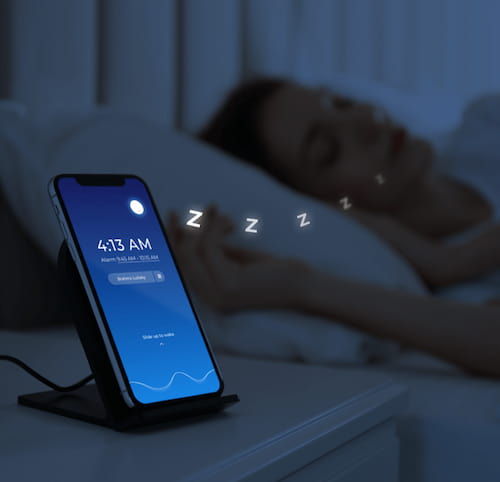If you often struggle with sleepless nights and feel tired in the mornings, you’re not alone. Sleep disorders can disrupt your daily routine and leave you feeling exhausted.
In this article, we will break down common sleep issues, helping you understand their symptoms and causes.
We will also provide practical tips for managing these disorders, including the use of ShutEye.ai ‘s sleep tracking app.
By taking charge of your sleep, you can improve your overall well-being and wake up feeling refreshed.
Key Takeaways
– Sleep disorders can greatly impact our health and well-being. To maintain optimal health, it is essential to recognize and manage these issues.
– By understanding the various types of sleep disorders, identifying their symptoms, and pinpointing common causes and triggers, we can take proactive steps to address our condition.
– Seeking professional help and using sleep tracking apps can be beneficial in effectively managing sleep disorders.
– Professionals can offer valuable insights and guidance, while sleep tracking apps can help us monitor our sleep patterns and detect potential issues.
– Taking action to address sleep disorders can have a positive impact on both our physical and mental health.
What are Sleep Disorders?
Sleep disorders are conditions that affect the normal patterns of sleep, leaving you feeling tired, groggy, and downright exhausted.
They are like pesky little creatures that sneak into your bedroom and mess with your precious slumber.
These disorders can interfere with your ability to fall asleep, stay asleep, or get restful sleep. They often go undetected, silently wreaking havoc on your well-being.

Types of Sleep Disorders
If you’re having trouble sleeping, it’s possible that you have a sleep disorder. Understanding the different types of sleep disorders can help you identify and manage your specific problem.
Insomnia
This sleep disorder refers to difficulty falling asleep, staying asleep, or experiencing poor quality sleep. Insomnia can lead to daytime fatigue, difficulty concentrating, and mood disturbances.
Sleep Apnea
Sleep apnea is characterized by disrupted breathing during sleep, resulting in multiple brief awakenings throughout the night.
This can cause excessive daytime sleepiness, loud snoring, and potentially serious health complications.
Narcolepsy
Narcolepsy is a neurological disorder that affects the brain’s control over sleep and wakefulness.
It causes excessive daytime sleepiness, sudden episodes of sleep, and muscle weakness or paralysis during emotional situations or stimulation.
Restless Legs Syndrome (RLS)
RLS creates an irresistible urge to move the legs, usually accompanied by uncomfortable sensations such as itching, tingling, or aching.
These symptoms worsen at rest, leading to difficulty falling asleep or staying asleep.
Parasomnias
This umbrella term comprises various abnormal sleep behaviors. Examples include sleepwalking, sleep talking, night terrors, sleep-related eating disorders, and REM sleep behavior disorder (acting out vivid dreams).
Circadian Rhythm Disorders
These disorders disrupt the normal sleep-wake cycle.
Examples include shift work sleep disorder (difficulty sleeping during the day due to work schedule), jet lag (temporary sleep difficulties due to rapid time zone changes), and delayed sleep phase disorder (difficulty falling asleep and waking up at socially acceptable times).
Hypersomnia
Hypersomnia is characterized by excessive sleepiness during the day, even after long or sufficient periods of nightly sleep.
It can interfere with daily activities, causing difficulties in concentrating and functioning.

Recognizing the Symptoms
If you want to recognize the symptoms of sleep disorders, pay attention to how you feel during the day and any patterns of difficulty sleeping that persist.
One common symptom is excessive daytime sleepiness. This means you feel excessively tired and struggle to stay awake during the day, even after a full night’s sleep.
Another symptom to watch out for is difficulty falling asleep or staying asleep, also known as insomnia.
Some people may experience restless leg syndrome. This is when you have an uncomfortable sensation in your legs that causes an irresistible urge to move them.
Sleep apnea is another sleep disorder to be aware of. It’s characterized by breathing interruptions during sleep. You may have sleep apnea if you snore loudly, gasp for breath, or wake up with a dry mouth or sore throat.
Other symptoms that could indicate a sleep disorder include nightmares, sleepwalking, and a feeling of mental fog or difficulty concentrating during the day. It’s important to recognize these symptoms because they may indicate an underlying sleep disorder.
Common Causes and Triggers
Sleep disorders can have different causes and triggers. One common cause is stress. High levels of stress can disrupt your sleep patterns, making it hard to fall asleep or stay asleep.
When you’re stressed, your body’s fight-or-flight response kicks in, releasing hormones like cortisol that can interfere with your sleep-wake cycle.
Another trigger for sleep disorders is poor sleep hygiene. This refers to habits and behaviors that can negatively impact your sleep.
Examples include irregular sleep schedules, consuming too much caffeine, and using electronic devices before bedtime.
These habits can disrupt your body’s natural sleep rhythms and make it difficult to get a good night’s rest.
There are also medical conditions that can cause sleep disorders. Sleep apnea, restless leg syndrome, and mental health disorders like anxiety and depression can all interfere with your sleep.
Identifying and managing these causes and triggers is crucial for effectively treating sleep disorders and improving the quality of your sleep.
Understanding the common causes and triggers of sleep disorders can help you take steps to improve your sleep hygiene and manage stress levels.
This may involve developing a consistent sleep schedule, limiting caffeine intake, and practicing relaxation techniques to reduce stress.
Getting quality sleep is essential for your overall well-being and functioning during the day.

Managing Sleep Disorders
Improve your sleep quality by following these effective strategies for managing sleep disorders.
Have a Consistent Sleep Schedule
Try to go to bed and wake up at the same time every day, even on weekends. This helps regulate your body’s internal clock and promotes better sleep.
Create a Relaxing Sleep Environment
Ensure that your bedroom is cool, dark, and quiet. Use comfortable bedding and pillows to make your sleep environment cozy.
Establishing a bedtime routine can also be helpful. Consider activities like reading a book or taking a warm bath to signal to your body that it’s time to wind down.
Cut on the Caffeine
Avoiding stimulants like caffeine and nicotine close to bedtime can aid in managing sleep disorders.
These substances can interfere with your ability to fall asleep and stay asleep. Instead, opt for a soothing herbal tea or some relaxation techniques to help you unwind before bed.
How Sleep Tracking Apps Can Help You

Sleep tracking apps are useful tools that can provide valuable insights into your sleep patterns.
These apps use sensors on your smartphone or wearable device to monitor important aspects of your sleep, such as how long you sleep, the different stages of sleep you go through, and the overall quality of your sleep.
By keeping track of your sleep, these apps can offer detailed information about your sleep habits.
For example, they can tell you how long it takes for you to fall asleep, how many times you wake up during the night, and how restful your sleep is.
This information can be very helpful in understanding your sleep patterns and identifying any issues that may be affecting your sleep quality.
They can also analyze your sleep data over time. This means that they can provide personalized recommendations to help improve your sleep hygiene and optimize your sleep schedule.
These recommendations can be tailored to your specific sleep patterns and can help you make positive changes to your sleep routine.
Sleep tracking apps also offer visualizations and graphs to help you easily interpret your sleep data.
These visual representations can help you identify any patterns or trends in your sleep patterns, which can be very useful in understanding how certain factors, such as stress or caffeine intake, may be impacting your sleep.
Seeking Professional Help
If you’re having trouble sleeping, it’s a good idea to seek professional help. Sleep disorders can greatly affect your overall health and well-being.
By getting professional assistance, you can receive the guidance and support you need to effectively manage these issues.
A sleep specialist or a healthcare professional with expertise in sleep medicine can conduct a thorough evaluation to determine the underlying causes of your sleep disorder.
They can then recommend suitable treatment options that are personalized to your specific needs.
Seeking professional help can provide you with a better understanding of your sleep patterns. It can help identify potential triggers or factors that contribute to your sleep disorder.
With this knowledge, you can develop a personalized treatment plan to improve the quality of your sleep.
Conclusion
Sleep disorders can have a significant impact on our health and well-being. It’s important to recognize and manage these issues to maintain optimal health.
By understanding the different types of sleep disorders, recognizing their symptoms, and identifying common causes and triggers, we can take proactive steps to manage our condition.
Seeking professional help and utilizing sleep tracking apps can be beneficial in effectively managing sleep disorders.
Professionals can provide valuable insights and guidance, while sleep tracking apps can help us monitor our sleep patterns and identify any potential issues.
With the right knowledge and tools, we can improve our sleep quality and overall quality of life. Taking steps to address sleep disorders can have a positive impact on our physical and mental health.
So, let’s prioritize our sleep and take action to ensure we get the rest we need.
Did you find this article helpful? You can check out our website for more awesome content like this.
Read Also
- Smooth Solutions: Effective Facial Hair RemovalKey Takeaways: – Evaluating the pros and cons of various techniques. – Learning about how to prepare for and maintain after facial hair removal. The Basics of Facial Hair Growth Understanding facial hair growth is fundamental to choosing the right hair removal approach. Hair grows in cycles, which include the active growing anagen phase, the… Read more: Smooth Solutions: Effective Facial Hair Removal
- Which Dental Procedures Are Safe During Pregnancy?When planning a family, moms-to-be are often concerned about the safety of dental procedures during pregnancy. It becomes important as oral health could directly impact both the mother’s and baby’s overall health. This article reviews which dental procedures are safe for pregnant women. These procedures aren’t just to keep moms at ease but to protect… Read more: Which Dental Procedures Are Safe During Pregnancy?
- Beyond Anime: Exploring DakimakuraAnime and manga have long enthralled viewers all around in the field of Japanese popular culture with their rich stories and vibrant characters. But among these popular elements of the otaku way of life, the dakimakura is a phenomenon that often attracts and occasionally causes questions. What is a Dakimakura? A Dakimakura which means “Hug… Read more: Beyond Anime: Exploring Dakimakura
- How Legal Assistance Can Simplify Elder Care for Ohio FamiliesManaging elder care can be an overwhelming experience for many families in Ohio. Legal assistance plays a crucial role in simplifying these processes. Understanding how to navigate the legal landscape is essential for ensuring your loved ones receive the best possible care. As the population ages, more families are grappling with the complexities of elder… Read more: How Legal Assistance Can Simplify Elder Care for Ohio Families
- The Essential Role of Care in Parkinson’s DiseaseParkinson’s disease is a progressive neurological condition marked by the gradual loss of dopamine-producing neurons in the brain. This depletion leads to a range of symptoms, including tremors, muscle rigidity, bradykinesia (slowness of movement), and difficulties with balance and coordination. While currently lacking a cure, effective care and management strategies play a pivotal role in… Read more: The Essential Role of Care in Parkinson’s Disease






